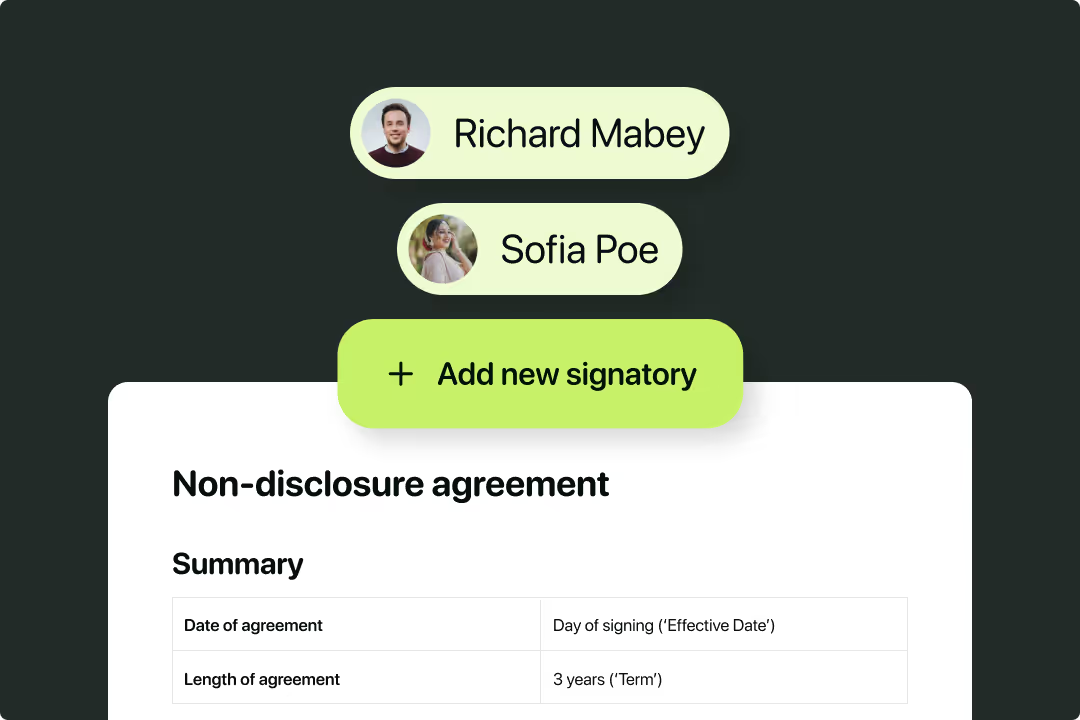Solutions
Customer Support
Resources
Whether you're part of a fast-growing scale-up or an enterprise navigating multiple departments, the way you structure your contract lifecycle management team matters. You need the right mix of legal oversight, operational know-how, and business alignment to make sure nothing falls through the cracks.
How can you build a team that drives results? In this guide, we'll explore exactly that, so you can optimize your team for efficiency and success.
Most contracts still don’t deliver real business value. Just 39 per cent of legal and contract practitioners say they support successful outcomes – a clear sign traditional approaches are falling short.
Effective contract lifecycle management empowers legal counsel and legal operations professionals to focus on strategic business priorities.
What’s more, with commercial teams like sales, procurement, and HR taking a more active role in managing contracts, you need to rethink how contracts flow, and who is doing what.

Here’s why your contract management team structure is critical:
There’s no one-size-fits-all structure for a contract management team, but the most effective ones include a mix of legal, operational, and business contributors.
Having a decent variety of titles means you have all bases covered and can play to people’s strengths. Here's a breakdown of the key roles in contract management.
Your legal counsel ensures every contract minimizes risk and aligns with your company’s legal obligations and strategy. They're especially crucial for high-value, high-risk, or highly regulated deals.
What they do:
Legal ops ensures contracts don’t get stuck in limbo. They bring structure, scalability, and data-driven insight to your contracting process—freeing legal to focus on strategy, not admin.
What they do:
Contract managers keep everything running smoothly after the dotted line is signed. They ensure that contractual obligations are tracked and fulfilled—reducing the risk of breach or missed opportunities.
What they do:
Commercial stakeholders are the ones closest to the deal. Their input ensures contracts serve real business goals—not just legal formalities. They also help speed up time-to-sign by answering key questions early.
What they do:
These roles safeguard your organization from budget overruns, poor vendor performance, and non-compliance with internal financial controls.
What they do:
Naturally, team structure can vary across different types of businesses. For fast-growing scale-ups, you’ll likely have a leaner team with legal operations as a central coordinator. Enterprises tend to have more specialized roles and experts across business units.
Whatever the size of the organisation, the principles stay the same: empower the business, protect the company, and use collaboration to scale.
With these roles and responsibilities established, contract collaboration – the process of stakeholders working together to create, negotiate and manage contracts – can happen.
Contract collaboration is when different individuals are in charge of different aspects of the contract lifecycle. It means legal counsel and legal operations professionals don’t have to carry everything.
Commercial teams start contracts using templates, legal makes key edits, and stakeholders sign off fast. Everyone does their part, without stepping on each other’s toes.
It’s how high-performing teams work. Without it, legal ends up stuck in the middle – owning every contract, clashing with the business, and getting pulled from strategic work.
No surprise then, that our recent State of In-House Report 2024 found that lawyers without a CLM are 1.5x more likely to face friction with sales. The message is clear: better contract collaboration means less firefighting, more impact.

If you feel that legal costs are rising, business teams are frustrated with delays or you’re spending more time chasing contracts than providing legal advice, now is the time to build or restructure your contract lifecycle management team. You should:
Start by understanding how contracts move through your organization today. Who initiates them? Where do they get reviewed? And—crucially—where do they get stuck?
Mapping the full lifecycle gives you visibility into bottlenecks and handoff points. It often reveals too much reliance on email, unclear ownership, and inconsistent timelines. Before you build new systems or bring in new tools, get the current lay of the land.
Contracting is a team sport—but only if every player knows their position. Each stage, from kickoff to negotiation to final sign-off, needs a clearly assigned owner.
Legal shouldn’t be dragged into low-risk templates, and sales teams shouldn’t be stuck waiting on routine approvals. By defining who owns what (and when), you create momentum and accountability across the entire lifecycle.
Signing orders are a great mechanism for this, as they invite the right stakeholders to contribute to the contract at the right time.

Once roles are set, codify the process. A good contract management plan or playbook outlines how things get done: what templates are used, which approvals are needed, what falls within self-serve territory, and when legal must step in.
It’s not just about rules—it’s about giving your teams the confidence to move quickly without compromising compliance. Done well, a contract playbook acts like your operating manual for safe, scalable contracting.
If your contracts live in email threads and shared drives, it’s time for an upgrade. A centralized platform, preferably one built for contract management, gives everyone a single source of truth.
By managing version control, tracking approvals, and enabling real-time editing, a modern contract management tool eliminates friction and reduces risk. It also ensures contracts don’t fall through the cracks once signed.
A robust CLM team empowers the business, not just the legal department. That means enabling commercial stakeholders to handle routine contracts on their own, within well-defined boundaries.
Training your team to use templates, follow playbooks, and escalate only when needed helps reduce legal bottlenecks. It also positions legal as a strategic advisor rather than a gatekeeper.
Finally, use contract data to continuously improve. Look at how long contracts take to close, how often they get stuck in legal, and where compliance issues tend to arise.
This isn’t just about efficiency—it’s about identifying patterns, minimizing risk, and proving the value of your CLM function to the business. The more insights you gather, the smarter and faster your process becomes.

Building a contract management team isn’t about adding headcount for the sake of it. It’s about creating a system where people, process, and platforms work in sync. With clear roles, thoughtful tools, and a culture of enablement, you’ll not only speed up contracting, you’ll turn it into a competitive advantage.
Juro's intelligent contract automation platform helps businesses create, agree, execute and manage contracts up to 10x faster than traditional tools. We are the only platform built specifically for both legal and commercial teams, so everyone can collaborate and move quickly, without chaos.
Work in one shared space – no more version hell. Collaborate in real time, right in your browser. Legal sets the rules with templates and approvals. Business teams work freely (but safely) within those guardrails.
Metadata is captured automatically, and role-based permissions keep things secure. Everyone gets just what they need.
Your contract management team is a strategic asset. With the right structure and Juro, you can reduce risk, close deals faster and deliver legal value at scale.
But don’t just take our word for it:
{{quote1}}
Fill in the form below to find out how Juro can power your contract management team and make collaboration seamless.

Lorem ipsum dolor sit amet, consectetur adipiscing elit. Suspendisse varius enim in eros elementum tristique. Duis cursus, mi quis viverra ornare, eros dolor interdum nulla, ut commodo diam libero vitae erat. Aenean faucibus nibh et justo cursus id rutrum lorem imperdiet. Nunc ut sem vitae risus tristique posuere.

